A giant German wind farm planning firm recently filed for bankruptcy, and the event made headlines. Craig Morris says the press coverage does not always clearly explain the difference between feed-in tariffs and “Genussrechte,” something that does not exist in English but could be translated as “participatory rights.” The event makes him think of an old Jimmy Stewart movie.

Unclear future ahead for Prokon investors. (Photo by pandrcutts, CC BY 2.0)
After the disaster in Fukushima, a company called Prokon started advertising on German television during the prime time. The ad is still up at YouTube (uploaded in June 2011), and even if you don’t speak German you can still marvel at the marketing prowess as a nuclear symbol turns into rotating wind turbine blades.
[youtube]http://www.youtube.com/watch?v=U0ipnUgVLwE[/youtube]
But as amazed as I was at the clever advertising, one thing was certain: I was not going to invest in this firm. I figured that, given the small returns possible from feed-in tariffs for wind power, a large share of the profits was probably going to TV ads now.
Nonetheless, a lot of people invested. Last year, they also began asking for their investments back – so many at a time, that the firm seems to have run out of liquidity. It has filed for bankruptcy.
In April 2011 and again in 2012, consumer advocates pointed out – based on court rulings, which found that the firm was misleading investors – that Prokon was not selling shares in community-owned wind projects, as many investors apparently expected. In such cases, investors are true shareholders; they own a stake in the turbines, and if there is enough wind they receive profits generally calculated at 5-7 percent, the target return for feed-in tariffs in Germany. (As the consumer advocates point out, Prokon was offering six percent.)
But Prokon was selling “Genussrechte,” a type of investment that – according to the German Wikipedia article – “only exists in Germany, Austria, and Switzerland.” Logically, there is no link to an equivalent Wikipedia entry in English, but it is worth reading the second half of the first paragraph (my translation):
“Voting rights are never included. The return is often quite high, but all other creditors are served first in the case of insolvency or liquidation before holders of Genussrechte are paid back. It is possible to lose the entire investment.”
Essentially, you get a share of the profits – or nothing, if there are none. The financial scheme is similar to the one proposed by transmission grid operator Tennet for citizen investments in grid upgrades. Consumer advocates also warned against these investments, though they are not purely Genussrechte, as I explained here.
An article in Der Spiegel makes it sound like Prokon is a typical problem in the wind sector, whereas perhaps Germany should consider getting rid of Genussrechte as a general investment option. Another article (in German) in German weekly Die Zeit provides a different perspective. The author portrays Prokon not as a ponzi scheme, but as a firm that has actually paid all of its bills up to now, but has run out of liquidity because so many investors want out. He seems to doubt that the firm would even be bankrupt were it not for the run on its liquidity. It reminds one a classic movie from 1941.
[youtube]http://www.youtube.com/watch?v=_Er69b4HMl8[/youtube]
Finally, one common assumption needs to be cleared up – feed-in tariffs do not guarantee profits. Nothing is “promised”, to use the word in the Spiegel report, which conflates Prokon with normal citizen-owned wind farms financed with feed-in tariffs, thereby repeating the mistake that these investors made. In my next post, I take a closer look at the risks that feed-in tariffs still entail.
Craig Morris (@PPchef) is the lead author of German Energy Transition. He directs Petite Planète and writes every workday for Renewables International.